Gig Economy: Flexible Jobs & New Career Opportunities in Singapore
Considering gig work in Singapore? Discover the pros and cons, and explore a list of 10 popular gig economy jobs that offer flexibility and diverse opportunities. Find out if gig work is right for you!

Work Anywhere, Anytime: The New Theme in Town
The gig economy is a new way of working that’s becoming popular in Singapore and around the world. Instead of having a full-time job with one employer, people in the gig economy take on short-term jobs or freelance work. This type of work includes driving for ride-sharing services like Grab, delivering food or making money online like writing, designing, and programming.
Digital platforms like Upwork, Fiverr, Deliveroo, and Grab make it easy for gig workers to find jobs. These platforms connect workers with clients or customers, allowing them to work on various projects. Singapore government has even recently roll out a policy to ensure gig workers get certain insurance and CPF as a form of safety net.
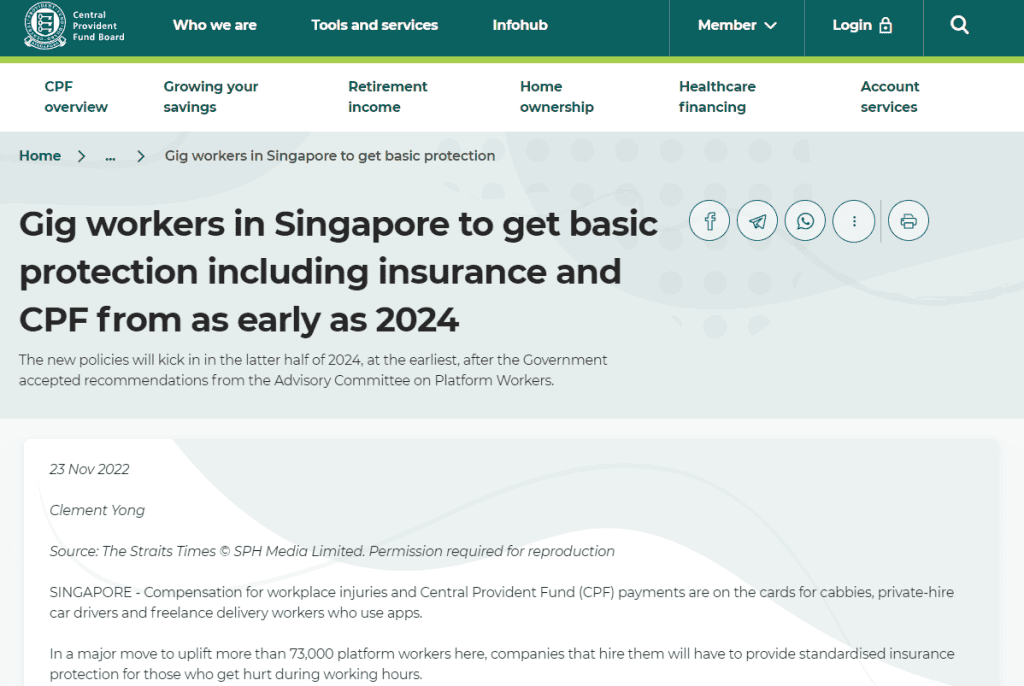
One of the biggest attractions of the gig economy is flexibility. People can choose when, where, and how much they want to work. This makes it a great option for those who need to balance work with other commitments, want to pursue their interests, or need time to think about what work they want to do next.
Gig work can also be a lifeline during tight moments, providing an income boost when it’s most needed. Sometimes, gig workers can even earn more than the average salary they would earn in a traditional full-time job.
Popular Gigs in Singapore
Singapore is an excellent place for gig work. The city’s advanced infrastructure, digital connectivity, and supportive government make it a safe space for people to try out for various gig economy opportunities.
Here are ten popular gig economy jobs in Singapore, detailing who they are suitable for, along with their pros and cons.
1. Private Hire Driver
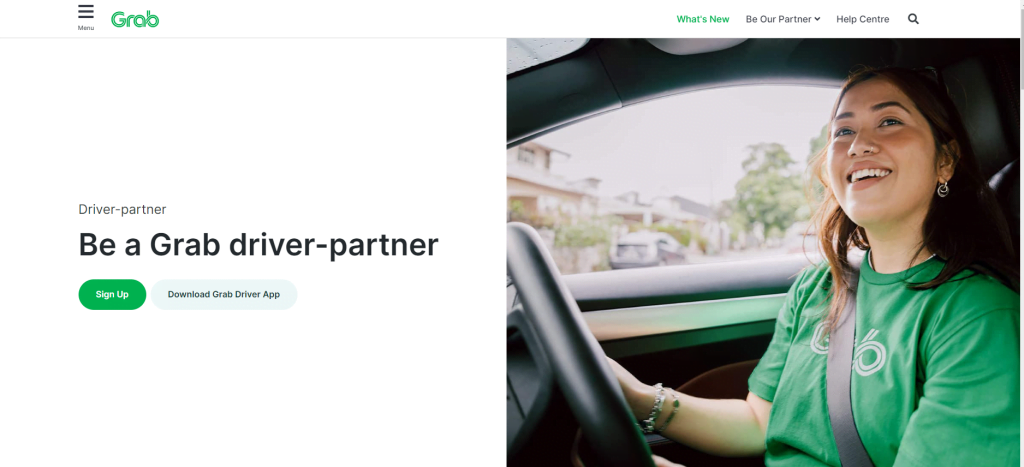
Being a private hire driver involves using your own car to transport passengers who book rides through apps like Grab or Gojek. It’s a flexible job that allows you to choose your own hours and work as much or as little as you like.
Pros:
- Flexible working hours
- Opportunity to meet new people
- Potential for high earnings during peak hours
- Independence and control over your schedule
Cons:
- Wear and tear on your vehicle
- Irregular income depending on demand
- Long hours on the road can be tiring
- Competition with other drivers
Earnings:
If you work full-time as a private hire driver, you can earn between SGD 3,000 to SGD 5,000 per month, depending on the hours worked and the demand during those hours. Earnings can be higher during peak periods and with incentives from the ride-hailing platforms.
Suitable MBTI Types: ISTJ, ESTJ, ISFJ, ESFJ. The key elements for being a successful private hire driver include reliability, punctuality, and a detail-oriented approach to maintaining the vehicle and providing excellent customer service.
2. Food Delivery

Being a food delivery driver involves picking up food orders from restaurants and delivering them to customers using apps like GrabFood, Foodpanda, or Deliveroo. You can use a car, motorcycle, bicycle, or even walk, depending on the delivery distance and your preference.
Pros:
- Flexible working hours
- Ability to choose your delivery area
- Opportunities for exercise if delivering by bicycle or on foot
- Tips from satisfied customers can boost earnings
Cons:
- Exposure to weather conditions
- Physical demands, especially if delivering by bicycle or on foot
- Wear and tear on your vehicle if using one
- Earnings can be inconsistent based on demand and time of day
Earnings: Full-time food delivery drivers can earn between SGD 2,000 to SGD 4,000 per month, depending on the number of deliveries completed, peak hour incentives, and tips. Earnings can be higher during weekends, holidays, and rainy days when demand surges.
Suitable MBTI Types: ISTP, ESTP, ISFP, ESFP. The key elements for being a successful food delivery driver include adaptability, quick problem-solving skills, and the ability to work independently while managing time effectively. Enjoying an active, on-the-go lifestyle is also beneficial.
3. Freelance Writer
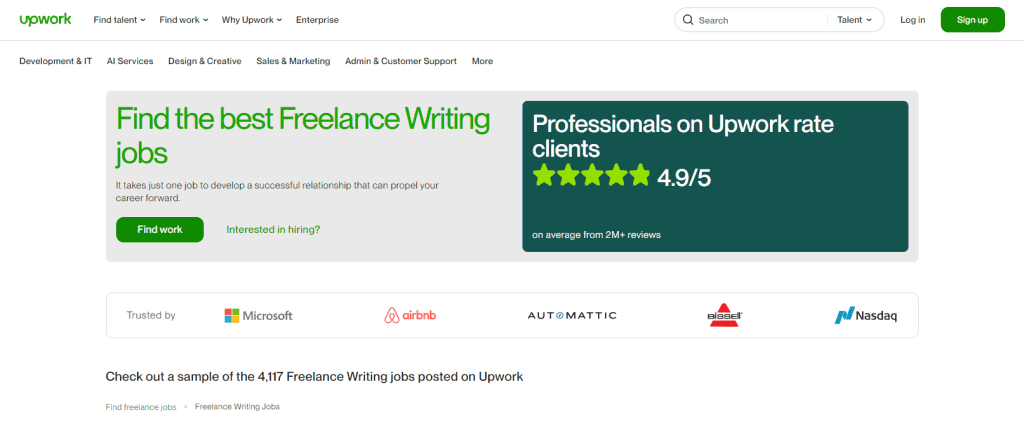
Being a freelance writer on Upwork involves creating various types of content for clients worldwide. This can include articles, blog posts, technical writing, copywriting, and more. You bid for projects that match your skills and negotiate terms with clients.
Pros:
- Flexibility to choose projects that interest you
- Ability to work from anywhere
- Opportunity to build a diverse portfolio
- Potential for high earnings with long-term clients
Cons:
- Income can be inconsistent, especially when starting out
- Competitive platform with many freelancers
- Requires strong self-discipline and time management
- Need to handle administrative tasks like invoicing and client communication
Earnings:
Full-time freelance writers on Upwork can earn between SGD 2,500 to SGD 6,000 per month, depending on their expertise, the complexity of the projects, and the number of hours worked. Experienced writers with a strong client base can earn even more.
Suitable MBTI Types: INFP, INFJ, INTJ, ENFP. The important elements for being a successful freelance writer on Upwork include creativity, strong writing and analytical skills, the ability to manage multiple projects, and a passion for learning and exploring new topics. Enjoying autonomy and having the discipline to meet deadlines is also crucial.
4. Part Time Delivery Driver
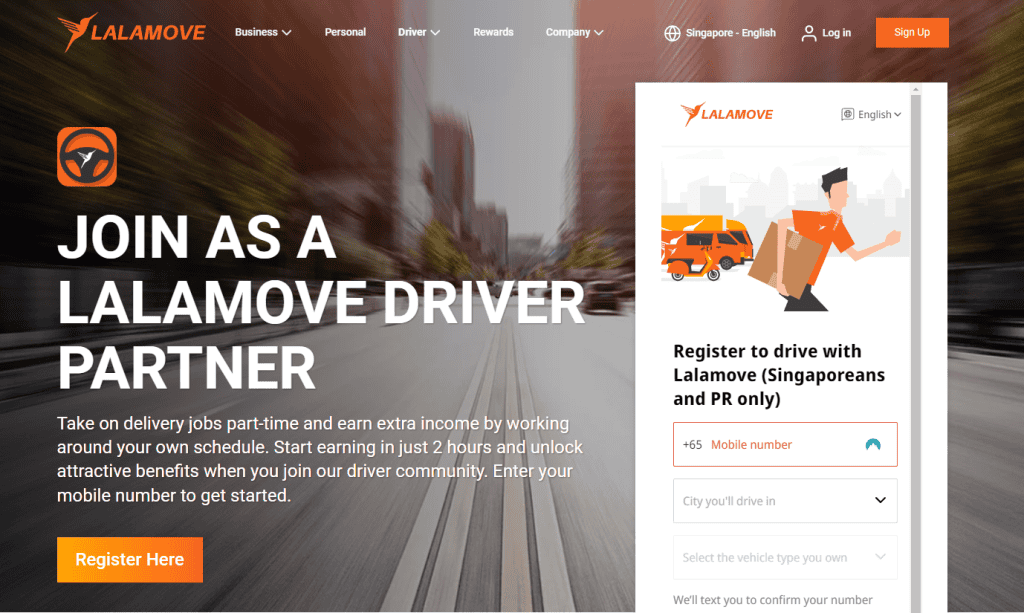
As a part-time delivery driver for services like Lalamove, you are responsible for transporting goods from one location to another. This can include delivering packages, documents, groceries, or even small furniture. You can use your car, motorcycle, or van, and you have the flexibility to choose when and how often you want to work.
Pros:
- Flexible working hours
- Ability to choose delivery jobs that suit your schedule
- Opportunity to earn extra income on the side
- Independence and control over your workload
Cons:
- Wear and tear on your vehicle
- Variable income depending on the number of deliveries and demand
- Possible long hours on the road
- Exposure to weather conditions
Earnings: Part-time delivery drivers for Lalamove can earn between SGD 10 to SGD 25 per hour, depending on the distance and size of the deliveries. If working full-time hours, this can translate to around SGD 2,000 to SGD 4,000 per month, but part-time earnings will vary based on the number of hours worked and the demand.
Suitable MBTI Types: ISTJ, ESTJ, ISFJ, ESFJ. The important elements for being a successful part-time delivery driver include reliability, punctuality, and a detail-oriented approach to handling deliveries. Enjoying a degree of physical activity and being comfortable navigating the city are also beneficial traits.
5. Part Time Home Baker

If you love to bake, you can explore being a home baker! As a part-time home baker, you create baked goods such as cakes, cookies, and pastries from your own kitchen and sell them through online platforms like Carousell and Facebook. You handle everything from baking and packaging to marketing and customer service.
Pros:
- Flexibility to bake and sell on your own schedule
- Opportunity to turn a hobby into a source of income
- Direct interaction with customers allows for personalized service
- Creative freedom to experiment with recipes and designs
Cons:
- Requires investment in baking supplies and ingredients
- Managing orders, inventory, and deliveries can be time-consuming
- Income can be inconsistent, depending on orders
- Need to adhere to local health and safety regulations for food preparation
Earnings: Part-time home bakers can earn between SGD 500 to SGD 2,000 per month, depending on the volume of orders and pricing of baked goods. During festive seasons and special occasions, earnings can increase significantly.
Suitable MBTI Types: ISFP, ESFP, INFP, ENFP. The key elements for being a successful home baker include creativity, attention to detail, and a passion for baking. Being personable and good at customer service is also important for building a loyal customer base. Enjoying hands-on work and having the ability to manage multiple tasks simultaneously are additional beneficial traits.
6. Home Tutor

If you are good with certain academic subjects and have patience for children, being a tutor as a gig can be quite rewarding! As a tutor, you provide one-on-one or small group instruction to students in various subjects. You can offer tutoring services in person or online, focusing on areas such as academic subjects, test preparation, or specific skills like languages or music.
Pros:
- Flexible working hours
- Opportunity to share your knowledge and help others succeed
- Potential for high hourly rates
- Ability to build long-term relationships with students
Cons:
- Requires preparation and planning for each session
- Income can be inconsistent, depending on the number of students and demand
- Need for strong communication and teaching skills
- Possible travel time if tutoring in person
Earnings: Full-time tutors can earn between SGD 3,000 to SGD 6,000 per month, depending on their expertise, the subjects taught, and the number of hours worked. Part-time tutors typically charge between SGD 25 to SGD 80 per hour, with specialized subjects or advanced levels commanding higher rates.
Suitable MBTI Types: INFJ, ENFJ, ISFJ, ESFJ. The important elements for being a successful tutor include strong communication skills, patience, and the ability to explain complex concepts in a simple way. Being empathetic and understanding students’ needs, as well as having a passion for teaching and helping others, are also key traits.
7. Freelance Photographers

As a freelance photographer, you capture images for various clients and projects, such as events, portraits, products, or real estate. You can work on assignments for individuals, businesses, or media outlets, and promote your services through platforms like Instagram, Carousell, or a personal website.
Pros:
- Flexibility to choose your own projects and schedule
- Creative freedom to express your artistic vision
- Potential for high earnings with specialized photography
- Opportunity to work in diverse environments and meet new people
Cons:
- Requires investment in quality camera equipment and editing software
- Income can be inconsistent, especially when starting out
- Need to continuously market yourself and find new clients
- Time-consuming post-processing and editing work
Earnings: Full-time freelance photographers can earn between SGD 3,000 to SGD 5,000 per month, depending on their niche, reputation, and the number of projects they secure. Part-time earnings will vary based on the frequency and scope of assignments, typically ranging from SGD 80 to SGD 300 per hour.
Suitable MBTI Types: INFP, ISFP, ENFP, ESFP. The key elements for being a successful freelance photographer include creativity, a keen eye for detail, and strong technical skills with camera equipment and editing software. Being personable and good at networking can help attract clients, while enjoying the flexibility and variety of freelance work is also important.
8. Handyman / Furniture Assembling
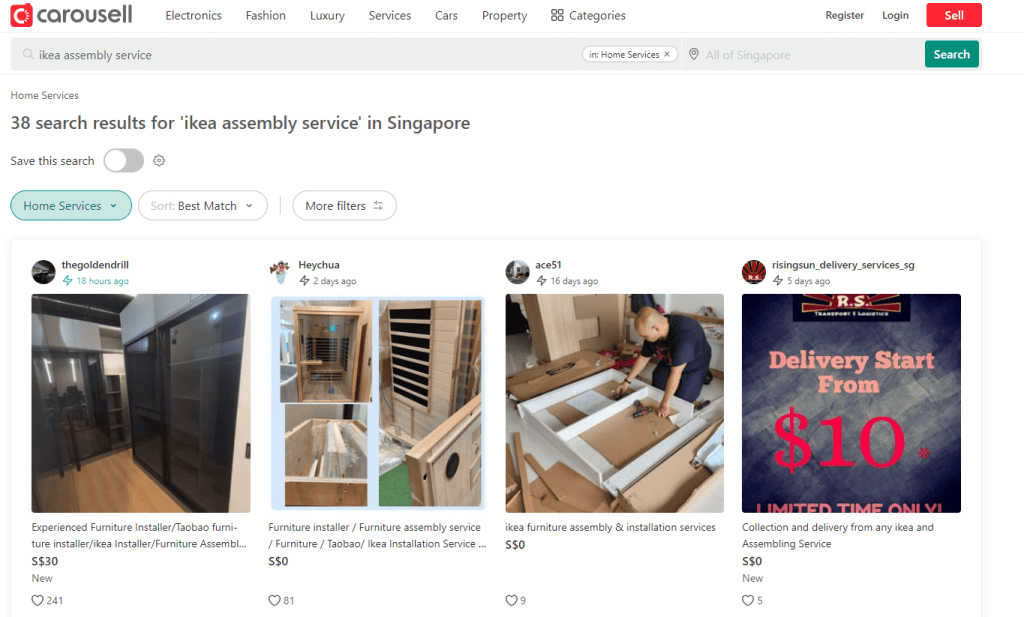
If you love fixing things, you may be surprised that people are willing to pay for handyman services in Singapore, to change lightbulb or to fix furniture. As a furniture fixer or handyman, you offer repair, home maintenance or assembly services for various types of furniture (typically bought from Taobao). You advertise your services on platforms like Carousell, where customers can book you for tasks such as fixing broken furniture, assembling new pieces, or performing minor home repairs.
Pros:
- Flexible working hours
- Opportunity to work on a variety of tasks
- Potential for high earnings with specialized skills
- Direct interaction with customers, which can build a strong client base
Cons:
- Physical demands of the job
- Need for a variety of tools and equipment
- Income can be inconsistent, depending on demand
- Travel time to different job locations
Earnings: Full-time furniture fixers or handymen can earn between SGD 2,500 to SGD 5,000 per month, depending on their skill level, the complexity of the jobs, and the number of hours worked. Part-time earnings will vary based on the volume of work and the rates charged, typically ranging from SGD 30 to SGD 100 per hour.
Suitable MBTI Types: ISTP, ESTP, ISFP, ESFP. The key elements for being a successful furniture fixer or handyman include practical problem-solving skills, manual dexterity, and a detail-oriented approach. Enjoying hands-on work, being adaptable, and having the ability to work independently are also important traits. Being personable and good at customer service can help build a loyal client base.
A Good Fit for Retirees, But Young People Should Plan Ahead
The gig economy is an unstoppable force that continues to attract more and more Singaporeans. Taking up gigs isn’t just for the young; it’s also a fantastic option for retirees looking for ways to stay active, engaged, and financially independent.
For older individuals, gig work can provide a sense of purpose and an opportunity to continue contributing to society while earning some extra income. Whether it’s driving for ride-sharing services, offering tutoring, or taking up freelance writing, retirees can find fulfilling work that suits their interests and schedules.
| Pros | Cons |
|---|---|
| Flexibility: Offers the ability to choose when, where, and how much they work, balancing other commitments such as studies, hobbies, or family responsibilities. | Income Variability: Lack of stable income with fluctuating earnings based on work availability and market demand, making financial planning challenging. |
| Skill Development: Provides opportunities to gain diverse experiences and develop a range of skills, enhancing resumes with varied job experiences. | Lack of Benefits: Gig workers typically do not receive traditional employment benefits like health insurance, retirement plans, or paid leave, leading to a lack of security. |
| Income Opportunities: Can sometimes pay more than traditional full-time positions, especially for high-demand skills, maximizing early career earnings. | Job Insecurity: The temporary nature of gig work offers less job security compared to full-time employment, causing potential periods of unemployment between gigs. |
| Entrepreneurial Spirit: Fosters an entrepreneurial mindset by teaching how to manage schedules, market services, and build a client base, valuable for any career path. | Isolation: Many gig economy jobs are performed independently, potentially leading to feelings of isolation and missing out on team or office social interactions. |
| Networking: Involves interacting with various clients and professionals, helping to build a strong professional network beneficial for future career opportunities. | Work-Life Balance: The on-demand nature can blur the lines between work and personal life if not managed properly, leading to burnout or stress. |
Young people should be cautious about relying solely on gig work in a competitive society like Singapore. While gig jobs offer flexibility and immediate earning potential, they lack the long-term security and benefits of traditional employment. It’s essential for young workers to have a solid plan for their future, whether it involves securing a full-time job or building a sustainable business.
Unlike traditional jobs, gig work doesn’t come with insurance, paid leave, or other employee benefits. This means that if you stop working, your income stops too. Therefore, it’s crucial for young people to consider their long-term financial stability and career growth.
Building a career with benefits, job security, and opportunities for advancement is important for ensuring a stable and prosperous future.
More Questions about Gig Work
Is the gig economy only for millennials?
No, the gig economy is for anyone who wants to work on a freelance basis, regardless of age.
Do gig workers make less money than traditional employees?
It depends on the individual and the type of work they do. Some gig workers can make more money than traditional employees by working on multiple projects simultaneously. However, others may struggle to find enough work or have to work for lower rates than they would as traditional employees.
Do gig workers have to pay their own taxes?
Yes, gig workers are responsible for paying their own taxes, as they are considered independent contractors.
Is the gig economy sustainable in the long run?
It’s hard to say at this point, as the gig economy is still relatively new. However, as more people turn to freelance work, companies may need to adapt to remain competitive.
Can gig workers work for multiple clients at the same time?
Yes, one of the advantages of the gig economy is that workers can work for multiple clients simultaneously, which can lead to increased earning potential
Explore More Content
Table of Content

